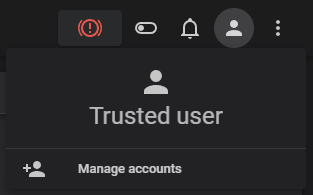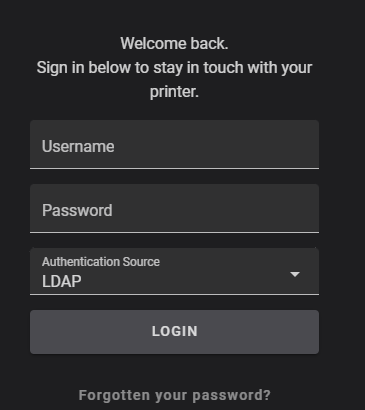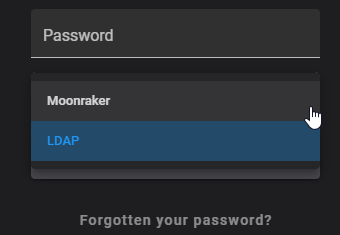Authorization
Table of contents
Fluidd supports JWT authorization through moonrakers authentication endpoints.
Setup
-
If you have a fluiddpi install from version 1.15+, then simply add a new user with Fluidd, after which time you’ll be prompted for authorization.
-
If you have an older fluiddpi install, add
force_loginsto your moonraker configuration. After restarting moonraker, add a user.
[authorization]
force_logins: true
Forced Logins?
-
With
force_loginsset totrueand with no users defined - moonraker defaults to yourtrusted_clients:setup. -
With
force_loginsset totrueand with one or more users defined - moonraker will ignore yourtrusted_clients:setup, and require authorization credentials. -
With
force_loginsset tofalse, moonraker will always rely on yourtrusted_clients:setup first.
Under default conditions, a fresh installation would have your client trusted. You can confirm this by noting your currently authenticated user.

Lost password?
Lost your only password? You need to revert to a trusted setup. You can do this by editing your moonraker.conf and turning force_logins to false.
LDAP - Configuration
Need central authorization? Configure LDAP to include your authentication server. Remove trusted_clients: from [authorization] to force authentication. You can also modify default_source to change the default login interface to ldap. The rest of the configuration can be found here:
[secrets]
secrets_path: ~/pathto/moonraker_secure.json
# For security reasons this file must be located in a different
# folder than `moonraker.conf`.
# ~ e.g. ~/klipper_secure/moonraker_secure.json
[ldap]
ldap_host: xxx.xxx.xxx.xxx or fqdn
# The host address of the LDAP server. This parameter must be provided
ldap_port: 636
# The LDAP server's port. The default is 389 for standard connections
# and 636 for SSL/TLS connections.
ldap_secure: True
# Enables LDAP over SSL/TLS. The default is False.
base_dn: DC=example,DC=local
# The base distinguished name used to search for users on the server.
# This option accepts Jinja2 Templates, see the [secrets] section for details.
# This parameter must be provided.
bind_dn: {secrets.ldap_credentials.bind_dn}
# The distinguished name for bind authentication. For example:
# CN=moonraker,OU=Users,DC=ldap,DC=local
# This option accepts Jinja2 Templates, see the [secrets] section for
# details. By default the ldap client will attempt to bind anonymously.
bind_password: {secrets.ldap_credentials.bind_password}
# The password for bind authentication. This option accepts Jinja2 Templates,
# see the [secrets] section for details. This parameter must be provided
# if a "bind_dn" is specified, otherwise it must be omitted.
group_dn: CN=exampleGroup,OU=exampleOU,DC=example,DC=local
# A group distinguished name in which the user must be a member of to pass
# authentication. This option accepts Jinja2 Templates, see the [secrets]
# section for details. The default is no group requirement.
is_active_directory: True
# Enables support for Microsoft Active Directory. The default is False.
moonraker_secure.json
{
"ldap_credentials": {
"bind_dn": "CN=bindUser,CN=Users,DC=example,DC=local",
"bind_password": "password"
}
}

